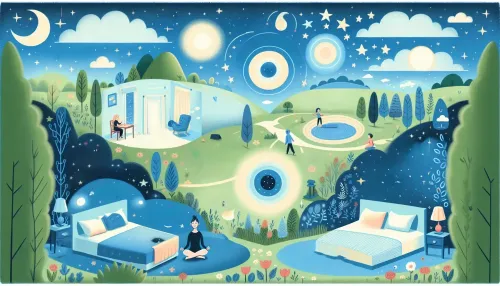Unlocking the Secrets of Sleep: Pathways to Restorative Rest

Sleep is a vital component of overall health and well-being, yet it can often feel elusive. From the science behind sleep cycles to the impact of technology and diet, understanding the intricacies of sleep is crucial for achieving restorative rest. In this comprehensive guide, we delve into the various facets of sleep, providing insights to help you create an ideal environment for rejuvenating sleep, manage screen time, explore natural sleep aids and prescription solutions, and decode the enigmatic world of dreams.
The Importance of Sleep for Health and Well-Being
Peppino's Health Haven: A good night's sleep is essential for optimal health and wellness. At Peppino's Health Haven, we understand the importance of delving into the science of sleep to help our audience achieve improved well-being.
The Science of Sleep Cycles: Understanding Their Impact
Understanding the science of sleep cycles is fundamental to comprehending the restorative nature of sleep. The sleep cycle consists of four stages, including non-rapid eye movement (NREM) stages 1, 2, and 3, and rapid eye movement (REM) sleep. Each stage plays a crucial role in physical and mental restoration, with REM sleep particularly associated with vivid dreaming and cognitive revitalization.
Research suggests that completing multiple cycles of these stages throughout the night is vital for overall wellness. Disruptions in these cycles can lead to various health issues, including decreased cognitive function, impaired immune response, and heightened stress levels. By incorporating this insight into your understanding of the importance of sleep, you can better appreciate how sleep impacts your overall health.
A conducive sleeping environment is instrumental in promoting restful sleep. Here are some strategies to transform your bedroom into an optimal haven for slumber:
Related Article: Wake Up Refreshed: Mastering the Perfect Sleep Environment
Creating an Ideal Bedroom Environment for Sleep
- Comfortable Bedding: Invest in high-quality pillows, mattresses, and bedding to enhance comfort and support during sleep.
- Regulated Temperature: Maintain a cool, well-ventilated room conducive to comfortable sleeping temperatures.
- Dim Lighting: Opt for soft, dim lighting that promotes relaxation and ease before bedtime.
- Clutter-Free Space: Keep the bedroom free from clutter to create a peaceful and calming atmosphere.
- Noise Reduction: Minimize disruptive noises using earplugs or white noise machines as necessary.
By implementing these tips, you can establish an environment that fosters restful and restorative sleep.
The prevalence of technology in our daily lives has brought forth challenges that can hinder restful sleep. Excessive screen time before bed has been linked to disrupted sleep patterns. Consider implementing the following practices to manage screen time for improved sleep quality:
- Digital Curfew: Set a designated time before bed when electronic devices are switched off.
Managing Screen Time: Tips for Better Sleep Quality
- Blue Light Filters: Utilize blue light filters on electronic devices or invest in blue light-blocking glasses to mitigate the impact of screen exposure on melatonin production.
- Wind-Down Routine: Engage in relaxing activities such as reading or meditation in lieu of screen time before bed.
These strategies can help minimize tech-related disruptions and contribute to better overall sleep quality.
Exploring natural remedies as well as prescription solutions can offer valuable options for improving sleep quality. Natural sleep aids such as valerian root, chamomile tea, melatonin supplements, and lavender aromatherapy have gained popularity for their potential to promote relaxation and improve sleep.
On the other hand, prescription solutions like sedative-hypnotic medications may be recommended in cases of chronic insomnia or other diagnosed sleep disorders. It is important to consult with a healthcare professional before considering any prescription solutions to ensure their suitability for your specific circumstances.
Natural Sleep Aids vs. Prescription Solutions: What Works?
Understanding the nuances of both natural sleep aids and prescription solutions empowers individuals to make informed choices based on their unique needs.
Nutrition plays a significant role in influencing sleep patterns and overall restfulness. Certain foods contain compounds that can either promote or hinder restful sleep. For instance:
- Foods that Promote Sleep: Incorporate foods rich in magnesium (e.g., spinach, almonds), tryptophan (e.g., turkey, bananas), and melatonin (e.g., cherries) into your diet to potentially aid in promoting better sleep.
- Foods that Disrupt Sleep: Limit consumption of caffeinated beverages, heavy or spicy meals close to bedtime, as well as alcohol intake, as they can disrupt natural sleep patterns.
The Connection Between Diet and Sleep Quality
By being mindful of dietary choices and their potential impact on sleep quality, individuals can take proactive steps toward improving their overall restfulness.
Peppino's Health Haven: Deciphering the meanings behind dreams can shed light on various aspects of our subconscious minds that may influence our restfulness. At Peppino's Health Haven, we believe that understanding dreams offers valuable insights into mental well-being.
Dreams are often regarded as windows into our subconscious thoughts and emotions. Exploring common dream themes such as flying, falling, or being chased can provide clues about underlying stress or anxiety that may impact restfulness during sleep.
While interpreting dreams requires careful consideration of individual context and emotions, paying attention to recurring dream themes can offer self-awareness and potentially identify areas in life that may be affecting overall restfulness.
Decoding Dreams: Insights into Your Sleep Quality
By unraveling the mysteries of dreams, individuals may gain deeper insight into their mental state and its correlation with their quality of rest.
Frequently Asked Questions
The sleep cycle consists of four stages: non-rapid eye movement (NREM) stages 1, 2, and 3, and rapid eye movement (REM) sleep. Each stage plays a crucial role in physical and mental restoration, with REM sleep linked to vivid dreaming and cognitive revitalization.
Disruptions in sleep cycles can lead to various health issues, including decreased cognitive function, impaired immune response, and increased stress levels. Completing multiple cycles throughout the night is essential for overall wellness and restorative sleep.
To create an optimal sleeping environment, invest in comfortable bedding, maintain a cool room temperature, use dim lighting, keep the space clutter-free, and minimize noise. These elements contribute to a peaceful atmosphere conducive to restful sleep.
Excessive screen time before bed can disrupt sleep patterns due to blue light exposure. Implementing a digital curfew, using blue light filters, and engaging in relaxing activities instead of screens can significantly improve your overall sleep quality.
Natural sleep aids include valerian root, chamomile tea, melatonin supplements, and lavender aromatherapy. These remedies may promote relaxation and improve sleep quality without the side effects often associated with prescription medications.
Prescription solutions may be recommended for chronic insomnia or diagnosed sleep disorders. It's essential to consult with a healthcare professional to determine if these medications are suitable for your specific circumstances and needs.
Nutrition significantly impacts sleep patterns. Foods rich in magnesium (like spinach), tryptophan (such as turkey), and melatonin (like cherries) can promote better sleep. Conversely, caffeine, heavy meals, and alcohol should be limited close to bedtime.
Common dream themes such as flying, falling, or being chased can reveal underlying stress or anxiety affecting your restfulness. Understanding these themes may provide insights into your mental state and its correlation with your sleep quality.
Deciphering dreams can offer valuable insights into our subconscious thoughts and emotions that may impact restfulness. By paying attention to recurring themes, individuals can gain self-awareness and identify areas in their lives affecting their overall well-being.
A clutter-free bedroom creates a calming atmosphere that promotes relaxation and restful sleep. Reducing visual distractions helps signal to your brain that it's time to wind down, making it easier to transition into a restful state at bedtime.



